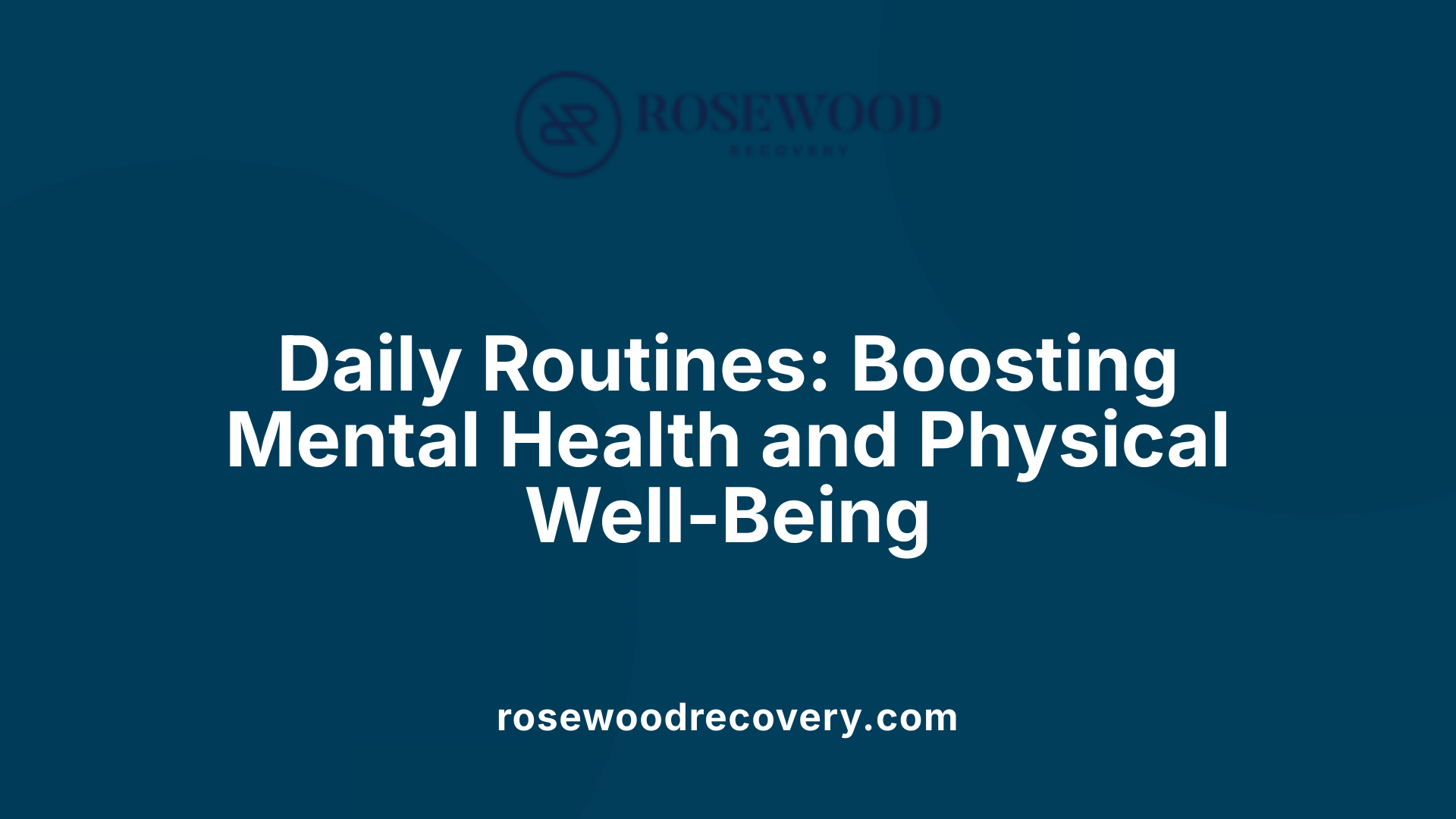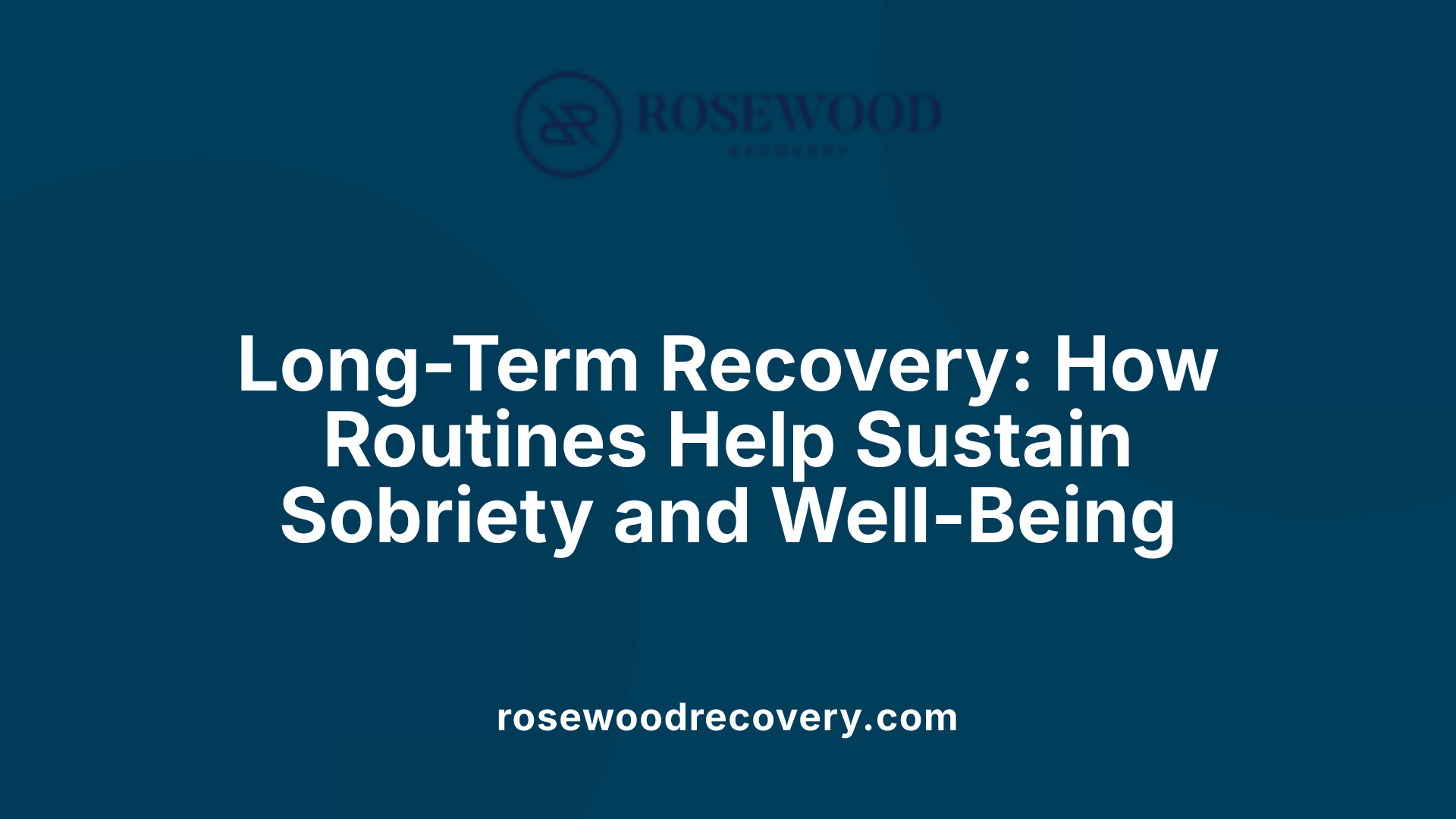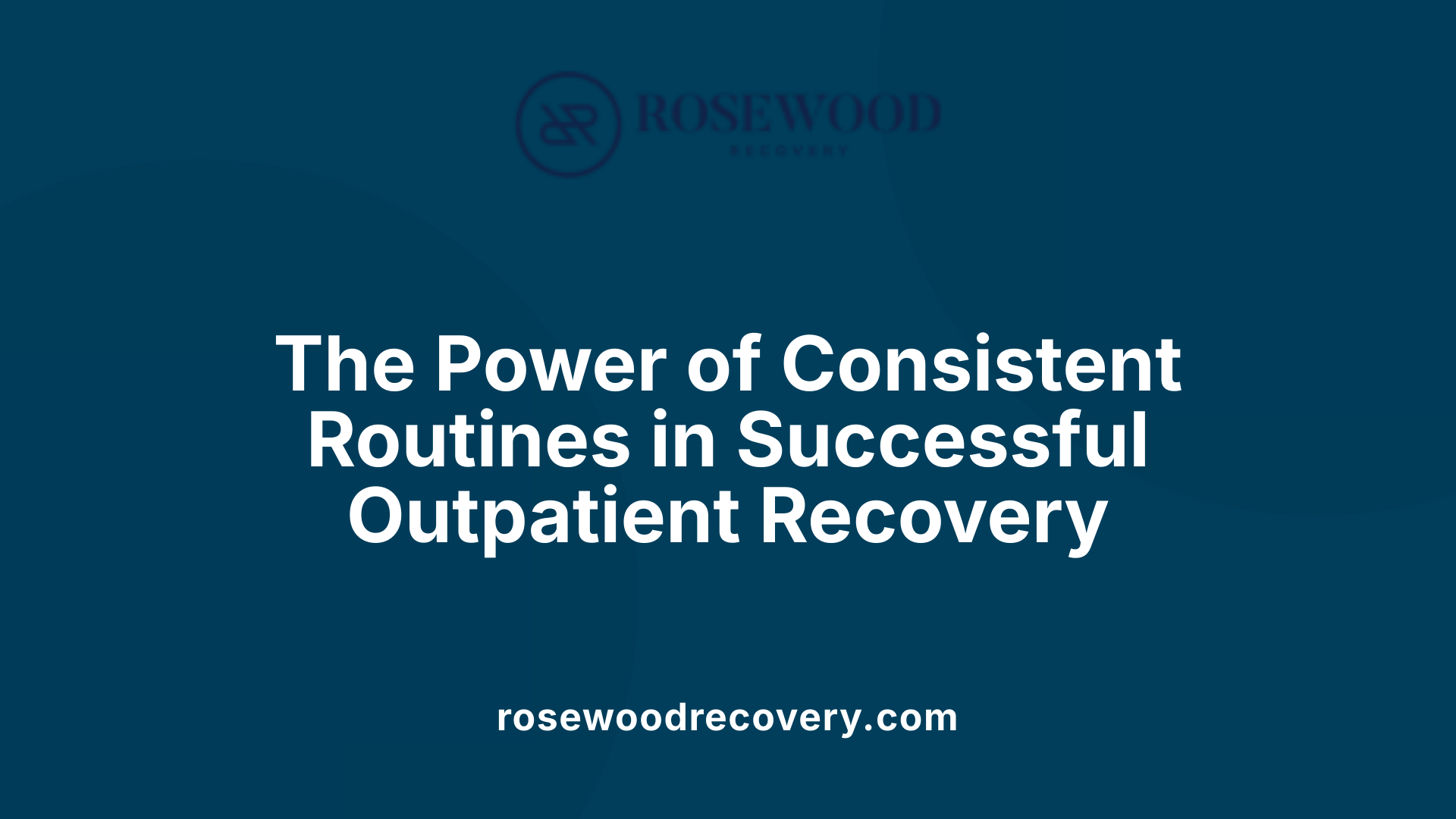The Power of Routine in Recovery
When it comes to outpatient programs like IOPs and PHPs, establishing a consistent routine is paramount. These structured schedules not only foster a sense of safety and stability but also serve as the backbone for effective therapy and lasting recovery. Understanding why routines matter can help individuals maximize their treatment outcomes and build healthier, sustainable habits.
Understanding PHP and IOP Structures

What is a typical PHP schedule?
A typical PHP (Partial Hospitalization Program) schedule involves attending treatment five days a week, generally for several hours each day. The daily activities include a combination of group therapy, individual counseling, family involvement, medication management, and skill-building workshops, often incorporating holistic therapies like yoga. The program usually lasts about 4 to 6 weeks, but the duration is flexible based on individual progress, with regular assessments guiding its length.
Participants return home in the evenings, allowing them to maintain some normal routines while receiving intensive support. This structured schedule helps stabilize symptoms, promote recovery, and serves as a transitional step between inpatient care and outpatient treatment.
What is the main difference between IOP and PHP?
The primary distinction between IOP (Intensive Outpatient Program) and PHP (Partial Hospitalization Program) lies in their intensity and time commitment. PHP is more intensive, involving 20-30 hours of treatment per week, with full-day sessions five days a week. It often includes medical monitoring and psychiatric evaluations, making it suitable for individuals with moderate to severe symptoms requiring closer supervision.
On the other hand, IOP typically involves 9-12 hours of treatment weekly, with sessions lasting from three to five hours daily, which allows individuals to continue working or attending school. IOP is ideal for those with milder symptoms or stable conditions, providing flexibility while still offering structured support.
Both levels of care act as critical bridges from inpatient treatment to outpatient therapy, with the choice of program informed by individual needs and clinical assessment.
What comes first, PHP or IOP?
In most treatment pathways, PHP (Partial Hospitalization Program) precedes IOP (Intensive Outpatient Program). PHP is designed for individuals requiring a higher level of care following inpatient hospitalization or residential treatment, or for those with more significant symptoms needing comprehensive support.
IOP generally follows PHP or is used as an initial step for people with milder symptoms. It offers a less intensive schedule that still provides essential therapeutic interventions while permitting greater independence.
In summary, PHP usually serves as the stepping stone before transitioning into IOP, aligning with treatment severity and individual recovery goals. This progression allows patients to gradually regain independence while still receiving the support necessary for stabilization and ongoing recovery.
| Program Type | Weekly Hours | Typical Duration | Primary Features | Ideal For |
|---|---|---|---|---|
| PHP | 20-30 hours | 4-6 weeks, flexible | Full-day sessions, medical oversight, medication management | Moderate to severe symptoms, post-inpatient care |
| IOP | 9-12 hours | 8-16 weeks, flexible | Part-day sessions, focus on relapse prevention and life skills | Mild to moderate symptoms, stable condition |
Both PHP and IOP play vital roles in the continuum of mental health and substance use disorder treatment, offering structured support while fostering independence. The clinical assessment will determine the appropriate level of care, ensuring each individual receives personalized treatment tailored to their unique needs.
The Impact of Routine on Emotional and Physical Stability
How routines promote emotional regulation and reduce stress
Establishing a regular routine in outpatient treatment settings like PHP and IOP plays a crucial role in helping individuals regulate their emotions and minimize stress. When daily activities follow a predictable pattern, it creates a sense of safety and control, which are essential for emotional balance. Such routines often include check-ins, therapy sessions, skill workshops, meals, and reflection periods, all of which contribute to a calming structure that reduces feelings of chaos or uncertainty.
This predictability helps clients manage anxiety and prevents emotional overwhelm, enabling them to stay engaged in their recovery. Additionally, routines support emotional regulation through the consistent practice of mindfulness, grounding exercises, and other therapeutic techniques like Dialectical Behavior Therapy (DBT). Over time, these habitual practices strengthen clients’ ability to handle difficult emotions, decrease mood swings, and foster resilience.
The role of structured schedules in managing withdrawal symptoms and cravings
Withdrawal symptoms and cravings can be overwhelming and pose significant risks for relapse. A structured schedule in PHP and IOP settings helps manage these challenges effectively. By keeping individuals occupied with planned activities such as therapy sessions, skills workshops, and peer support groups, routines minimize idle time that could lead to triggers.
Engaging consistently in productive activities distracts from cravings and reduces the likelihood of relapse. Moreover, structured routines facilitate early detection and intervention for withdrawal symptoms by providing regular monitoring and immediate access to medical and therapeutic support. This continuous engagement allows clients to develop and reinforce coping skills, manage symptoms more effectively, and gradually regain control over their reactions to triggers.
Why is structure and consistency important during outpatient treatments?
Consistency and structure are fundamental to outpatient treatment because they lay the groundwork for ongoing recovery. A stable routine encourages active participation in therapy and other therapeutic activities, enabling clients to track progress and recognize improvements. Regular schedules help create a sense of normalcy, which reduces anxiety and stress associated with uncertainty.
Furthermore, consistency in attending sessions and practicing learned skills fosters accountability and motivation. It also helps re-establish healthy habits around sleep, nutrition, hygiene, and exercise, which are vital for overall well-being. When clients follow a predictable routine, it’s easier to manage cravings, avoid triggers, and stay committed to recovery goals. This systematic approach promotes resilience and enhances the effectiveness of treatment, setting a foundation for long-term sobriety.
Why is maintaining a routine important during outpatient programs?
Maintaining a routine during outpatient programs offers vital support for individuals navigating recovery. It provides structure that anchors daily life, promoting feelings of security and predictability. Such routines make it easier to develop self-control and discipline, which are essential for resisting temptations and managing stress.
Healthy routines encourage regular habits such as balanced eating, physical activity, and sufficient sleep, all contributing to physical health and emotional stability. They also prevent boredom and aimlessness, which can lead to cravings or risky behaviors. Consistent schedules foster accountability and make it easier to monitor progress, boosting motivation and confidence. Overall, routines support emotional well-being, reinforce positive habits, and help individuals stay aligned with their recovery objectives.
How do structured schedules benefit individuals in IOP and PHP?
In both IOP and PHP, structured schedules serve as the backbone of effective treatment. They create a sense of stability by outlining specific times for therapy, skill-building activities, peer interactions, and self-care. This organized approach fosters emotional regulation by encouraging clients to practice coping techniques in a safe, predictable environment.
Structured schedules also promote the development of healthy habits and routines—such as regular meal times, exercise, and sleep—that support physical health. They facilitate engagement with various therapeutic modalities like cognitive-behavioral therapy, DBT, and group support, which are delivered consistently throughout the day, enhancing learning and retention.
Moreover, these routines boost accountability by providing clear expectations and goals, encouraging clients to stay committed. The regular rhythm helps reduce uncertainty, manage cravings, and prevent relapse, ultimately creating a solid foundation for sustained recovery and increased independence.
The Role of Daily Routines in Mental and Physical Well-being

How routines support mental health and addiction recovery
Establishing a daily routine is vital for individuals in mental health treatment and addiction recovery. Such routines provide a sense of stability and predictability, which are especially important during turbulent times. When routines are in place, they help reduce feelings of anxiety and stress by creating a structured environment where individuals know what to expect each day.
A consistent schedule supports management of triggers, cravings, and withdrawal symptoms. This predictability minimizes confusion and emotional upheaval, making it easier to stay on course with recovery goals. Routine activities like regular sleep patterns, balanced nutrition, and scheduled exercise promote both emotional and physical health.
Furthermore, routines facilitate the integration of therapeutic activities and social support. By including things like group sessions, self-care practices, and family involvement, routines foster emotional healing, boost self-esteem, and promote long-term adherence to recovery strategies. These structured patterns serve as a foundational element that empowers individuals to regain control and build resilience, essential for lasting recovery.
The Benefits of Routines for Long-term Recovery

Why is long-term consistency important in recovery?
Long-term consistency plays a vital role in sustaining recovery from mental health challenges and substance use disorders. When individuals maintain regular routines, they create a stable environment that reinforces new habits and coping skills. This consistency helps to solidify behavioral changes, which reduces the likelihood of relapse.
Engaging in daily habits such as structured meals, sleep schedules, therapy, and wellness activities cultivates resilience and emotional stability. It also enables individuals to detect early signs of stress, triggers, or warning symptoms, allowing for prompt intervention.
Over time, committing to these routines fosters a sense of purpose and boosts confidence in managing one’s recovery independently. The repetition of positive behaviors transforms initial efforts into lasting change. Ultimately, long-term consistency is about making healthy behaviors second nature, ensuring that recovery is not just temporary but sustainable.
How do routines support relapse prevention and rebuilding a sober life?
Routines serve as the backbone of relapse prevention by providing a predictable and purposeful structure that keeps individuals engaged in positive activities. When daily life is organized around consistent routines, there is less space for boredom, impulsivity, or vulnerability to triggers that can lead to relapse.
Healthy habits like meal times, physical activity, mindfulness, and regular therapy sessions create a stable foundation for sober living. These routines foster accountability by helping individuals track their progress and recognize early signs of relapse.
Furthermore, maintaining a stable routine enhances emotional regulation and self-control, essential components of long-term sobriety. It also helps rebuild a meaningful life by giving individuals goals and a sense of achievement in their everyday activities.
By serving as a continuous scaffolding, routines empower individuals to navigate challenges effectively and sustain their recovery journey.
What strategies can support routine development in outpatient recovery?
Developing and maintaining routines in outpatient recovery requires practical strategies that promote consistency and flexibility. Setting clear, achievable goals is the first step—such as waking up and going to bed at the same time each day and scheduling regular therapy and support group sessions.
Utilizing reminders, planners, or digital apps can help individuals keep track of their daily activities and commitments. Incorporating activities they enjoy, including hobbies, exercise, and self-care, increases motivation and sustainability.
Building a support network is also crucial; family, friends, peers, and therapists can provide encouragement, accountability, and reassurance. Flexibility should be woven into routines to accommodate life changes without disrupting stability.
Patience and repetition are vital; forming new habits takes time, and positive reinforcement can help embed these routines into daily life. Over time, these strategies cultivate habits that become natural parts of maintaining a sober and balanced lifestyle.
| Strategy | Description | Benefit |
|---|---|---|
| Set clear goals | Define specific daily activities | Provides direction and focus |
| Use reminders | Employ planners or apps | Enhances adherence |
| Include enjoyable activities | Add hobbies and self-care | Improves motivation |
| Build support networks | Engage family and peers | Offers encouragement and accountability |
| Allow flexibility | Adapt routines as needed | Ensures sustainability |
| Practice patience | Repeat regularly | Reinforces habits |
This combination of strategies helps individuals develop effective routines that support their recovery journey and foster long-term well-being.
Conclusion: The Significance of Consistent Routines in Recovery

Why are routines fundamental to effective outpatient treatment?
Routines are foundational to successful outpatient treatment because they create a sense of stability, predictability, and active participation in one's recovery process. When individuals establish consistent daily habits, they are better able to manage stress, reduce triggers, and reinforce positive behaviors. Routine activities like regular therapy sessions, healthy eating, exercise, and adequate sleep help build emotional resilience and promote mental health. Having a structured schedule also enhances accountability, making it easier to monitor progress and stay committed to recovery goals.
Moreover, routines serve as a practical framework for integrating therapeutic insights into everyday life. They reduce decision fatigue by minimizing uncertainty, which is especially important when navigating complex emotional states or cravings. With a dependable routine, individuals feel more in control, which boosts confidence and supports lasting behavioral change.
In essence, routines act as the backbone of outpatient programs, bridging the gap between therapy sessions and real-world application. They transform recovery from abstract goals into concrete daily actions, empowering individuals to maintain sobriety and mental well-being over the long term.
The Lasting Power of Routine in Recovery
In outpatient programs like IOPs and PHPs, establishing and maintaining a consistent routine is more than just a structured schedule—it is a vital foundation for lasting recovery. Routines support emotional stability, promote healthy habits, reduce stress, and foster accountability, making recovery more manageable and sustainable. While the journey may involve adjustments, embracing discipline and predictability can transform initial progress into long-term sobriety and mental wellness. Building routines is an ongoing process of commitment, patience, and flexibility—key ingredients for success in achieving a meaningful, substance-free life.
References
- How a Structured Routine in PHP Boosts Mental Health Recovery
- The Importance of a Structured Routine in Outpatient Addiction Rehab
- PHP vs IOP: What's The Difference? - The BridgeWay
- How is Therapy Integrated with Daily Life in Partial Hospitalization ...
- PHP vs. IOP: The Difference Between Treatment Programs
- Why Routine Matters in Addiction Recovery
- Intensive Outpatient Programs vs. Partial Hospitalization




